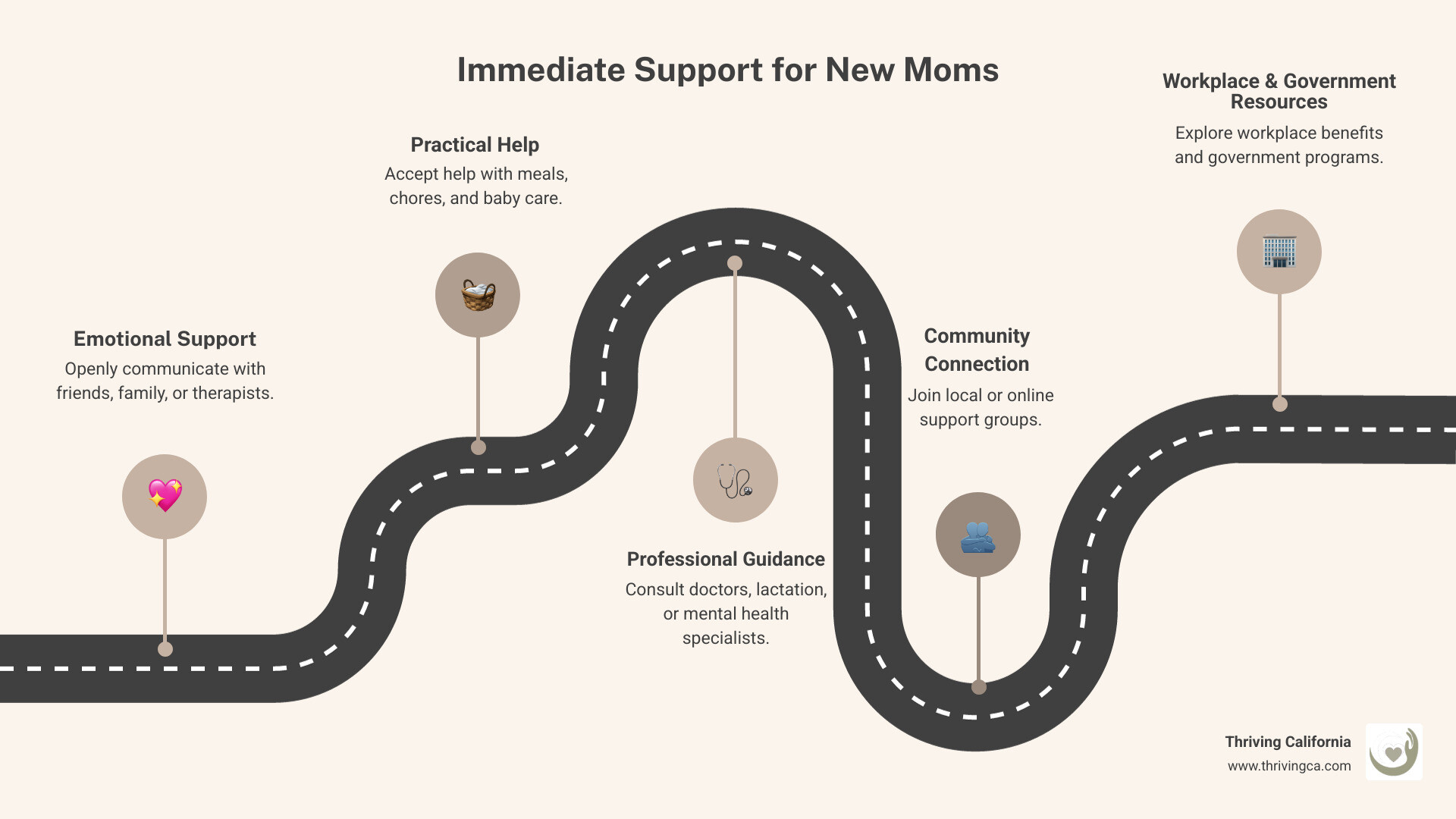Support For New Moms: Navigating New Motherhood in California

The transition into motherhood represents one of life's most profound transformations. For new moms across California, from Napa to Lafayette to Thousand Oaks, finding comprehensive support during the postpartum period can make the difference between struggling alone and thriving with your growing family. At Thriving California, our group practice specializes in supporting parents through pregnancy and these early, formative years with their children.
Understanding the New Mother's Journey Through Motherhood
The weeks and months following childbirth bring dramatic changes that extend far beyond the physical recovery from delivery. This postpartum period, often referred to as the "fourth trimester," encompasses the first three months after birth when both mothers and baby undergo significant adjustments. During this time, new mothers experience hormonal fluctuations that affect their well-being, sleep disruption, and identity shifts that can feel overwhelming even in the best circumstances.
The emotional landscape of new motherhood contains both extraordinary joy and unexpected challenges. While society often emphasizes the blissful aspects of having a baby, the reality includes moments of doubt, exhaustion, and uncertainty that deserve equal acknowledgment and support. Understanding that these mixed feelings are entirely normal forms the foundation for healthy adjustment to parenting and family well-being.
Research indicates that approximately one in eight women experiences mental health challenges after giving birth, yet many cases go unaddressed due to stigma, lack of awareness about risk factors, or difficulty accessing appropriate care. Recognizing the symptoms early and knowing where to connect with help empowers new moms to prioritize their health alongside their baby's needs. Education about postpartum experiences helps families understand what to expect during this transformative time.
Recognizing Common Postpartum Mental Health Challenges
The Spectrum of Postpartum Depression and Anxiety
Many new mothers experience mild mood fluctuations known as the "baby blues" during the first two weeks postpartum. These temporary feelings affect up to 80% of women and typically resolve on their own as hormones stabilize and mothers adjust to parenting their new baby. However, when symptoms persist beyond two weeks or intensify rather than improve, they may indicate the presence of Perinatal Mood and Anxiety Disorders (PMADs).
Postpartum depression extends beyond typical new parent exhaustion or stress. Depression symptoms may include persistent sadness affecting daily life, loss of interest in previously enjoyable activities, significant changes in appetite or sleep patterns beyond what's expected with a newborn, feelings of worthlessness that impact parenting confidence, difficulty concentrating while taking care of baby, and in severe cases, thoughts requiring immediate professional intervention.

Understanding Anxiety Disorders in New Moms
Postpartum anxiety often receives less attention than depression but affects many mothers during the postpartum period. Unlike typical new parent worries, anxiety disorders involve excessive concerns that interfere with daily functioning and family well-being. Physical symptoms may include racing heart during breastfeeding, difficulty breathing, muscle tension, or gastrointestinal distress. Mental symptoms often center around catastrophic thinking about the baby's safety or health, creating stress cycles that feel impossible to escape.
Some mothers experience postpartum obsessive-compulsive symptoms, characterized by unwanted, disturbing thoughts about their children. These intrusive thoughts cause significant distress precisely because they contradict what moms actually desire for their families. To manage this anxiety, mothers may develop repetitive behaviors that affect their ability to connect with their baby or partner.
The Impact of Birth Trauma on Parents
Birth trauma represents another significant challenge that can affect new mothers' mental health during the postpartum period. This psychological response stems not from the objective medical events of childbirth but from the subjective experience during labor and delivery. Whether the birth involved complications during pregnancy, emergency interventions, or simply didn't unfold as hoped, the emotional aftermath can affect the entire family's well-being.
Symptoms of birth trauma may include intrusive memories of the childbirth experience, avoidance behaviors that impact bonding with baby, heightened anxiety affecting daily parenting, and challenges connecting emotionally with children. Partners who witnessed difficult labor may also experience secondary trauma. It's important to note that all birthing people, regardless of gender identity, can experience birth trauma and deserve compassionate support.
Building Your Support Network for Family Well-Being
The Essential Role of Community and Social Connection
The phrase "it takes a village" holds particular relevance for new moms navigating the demands of early parenting. Research consistently demonstrates that strong social connection and support networks significantly reduce risk factors for postpartum mental health challenges while enhancing both maternal confidence and infant health. This village doesn't need to be large; even a few reliable individuals who understand pregnancy and childbirth experiences can provide the emotional validation that makes an enormous difference.
Creating this support network often requires intentional effort to connect with others, especially in our modern society where extended families may live far away. Start by identifying people in your life who offer different types of support for new moms: those who listen without judgment, those who provide practical help with child care, and those who share similar parenting experiences or values. Building these connections during pregnancy can help establish support before baby arrives.

Maximizing Partner Support During the Postpartum Period
Partners play a uniquely important role in supporting mothers through pregnancy, childbirth, and beyond. Supportive partners actively protect the mother's need for rest during the postpartum period, manage household logistics that affect family health, advocate for her needs with healthcare providers, and provide emotional validation during moments when anxiety or depression symptoms emerge.
Effective partner support involves anticipating needs rather than waiting to be asked. This might mean taking care of the baby for early morning feedings, managing visitors to prevent stress, ensuring nutritious meals support breastfeeding mothers, or simply listening to concerns about parenting challenges. Partners who educate themselves about postpartum recovery, perinatal mood disorders, and risk factors can better recognize when additional support might benefit their families.
Practical Support from Family and Friends for New Parents
Well-meaning loved ones often want to help new moms but may not know the most effective ways to offer assistance during the postpartum period. The most valuable support tends to be specific and action-oriented. Instead of vague offers, friends and families can provide concrete help like preparing meals that support breastfeeding and recovery, handling household tasks while parents bond with baby, providing child care for older children, or creating opportunities for mothers to rest and restore their well-being.
Emotional support from loved ones matters just as much for new mothers navigating motherhood. Creating space for moms to talk about genuine feelings without fear of judgment provides essential validation. Sometimes the most supportive action is acknowledging how challenging pregnancy, labor, and early parenting can be while affirming the mother's capabilities.

Professional Support and Education for Families
When Parents Should Seek Professional Help
Determining when to seek professional support during the postpartum period requires honest self-assessment about symptoms and their impact on daily life. Consider reaching out if depression or anxiety persists beyond the baby blues timeline, interferes with taking care of your children, affects your ability to connect with your baby, or impacts overall family well-being despite other support efforts.
At Thriving California, our group practice provides specialized therapy for parents with young children from birth through age three. Our doctoral-level clinicians understand the unique challenges facing mothers and fathers during pregnancy and the postpartum period. We work with individuals and couples experiencing perinatal mood concerns, adjustment to parenting, relationship changes after childbirth, and birth trauma, tailoring our approach to each family's specific needs.
Our Therapeutic Approach for New Moms and Parents
Our therapeutic work with new mothers draws from several evidence-based modalities while maintaining focus on the parent-child relationship and family health. We integrate psychodynamic and relational therapy to explore how past experiences affect current parenting. For appropriate clients, we incorporate Internal Family Systems therapy to understand different aspects of self that emerge during motherhood. Couples benefit from our Gottman-informed approach to strengthening partnerships during the stress of early parenting.
For parents healing from birth trauma, we offer specialized treatment addressing experiences during pregnancy, labor, and childbirth. This structured approach typically begins with exploring the entire birth story, helping mothers and birthing people process difficult memories while building resources for ongoing healing. Through this process, we help reduce the emotional charge of traumatic childbirth memories. Individual birth trauma therapy typically spans three to six sessions, while couples often benefit from six to twelve sessions as they work to restore family well-being.
Getting Started with Support Services
Beginning therapy at Thriving California starts with a supportive process designed to connect new moms with appropriate care. Most mothers begin by scheduling a free consultation to talk about their specific concerns related to pregnancy, postpartum experiences, or parenting challenges. During this conversation, we learn about your symptoms and goals while you ask questions about our approach and logistics. If we determine we're not the best match for your needs, we provide thoughtful referrals to other qualified professionals who support families.
For parents ready to begin without a consultation, you can proceed directly to scheduling. We use the initial appointment to assess compatibility and establish preliminary goals for supporting your mental health during this important life transition. Virtual clients throughout California receive secure video session links, making support accessible whether you're managing child care schedules or recovering from childbirth.
What New Parents Can Expect in Ongoing Therapy
Once therapy is established, most new mothers meet weekly for 50-minute sessions, though we adjust frequency based on individual needs during different phases of the postpartum period. For longer-term work, we focus on building a therapeutic relationship where mothers feel safe exploring vulnerable aspects of their parenting journey. We might examine connections between current struggles and past experiences, explore how pregnancy and birth affected identity, or provide space to process the overwhelming changes that affect family dynamics.
Individual therapy allows moms to lead with pressing concerns, whether unpacking childhood experiences influencing their parenting, addressing postpartum symptoms, or developing strategies for managing stress. We occasionally suggest resources supporting recovery and well-being but don't assign formal homework that adds to already full plates.
For couples navigating new parenthood together, we help identify patterns affecting their connection, facilitate communication about changing needs after baby arrives, and explore how each partner's background influences their approach to parenting and family life. Our work remains flexible to support families through various challenges of early childhood.
Practical Resources and Self-Care for Mothers
Prioritizing Well-Being Without Guilt
Self-care for new moms during the postpartum period isn't about elaborate routines—it's about meeting basic health needs sustainably. This might mean taking brief breaks throughout the day, maintaining nutrition that supports breastfeeding and recovery, engaging in gentle movement when energy allows, or adjusting expectations while taking care of a newborn. Recognizing that maternal well-being directly affects the whole family helps mothers prioritize their needs.
Rest remains paramount during the postpartum period, even when caring for children makes it challenging. Prioritizing sleep over non-essential tasks, accepting help from partners and families to create rest opportunities, and recognizing that exhaustion amplifies depression and anxiety symptoms makes rest foundational rather than luxury. Education about normal sleep patterns for both mothers and babies helps set realistic expectations.

Accessing Community Resources for Support
Beyond individual therapy, various resources provide valuable support for new moms navigating motherhood. Healthcare providers serve as important touchpoints for screening perinatal mood disorders and providing education about risk factors. Being honest about mental health symptoms during appointments ensures appropriate support and intervention for mothers and families.
National helplines offer immediate support when local resources aren't accessible. The National Maternal Mental Health Hotline provides 24/7 support for pregnant women and new mothers. These services connect moms experiencing similar challenges and provide education about postpartum mental health, helping reduce isolation during this vulnerable time.
Navigating Work and Child Care Considerations
For mothers returning to work after pregnancy and childbirth, understanding available accommodations helps reduce stress during this transition. Workplace protections ensure employees have rights regarding breastfeeding support and recovery time. Progressive employers increasingly recognize that supporting new parents through flexible schedules benefits both families and organizations.
Planning for child care represents another significant consideration affecting family well-being. Whether families choose family care, professional child care services, or alternative arrangements, having reliable support allows mothers to address their mental health needs while ensuring children receive quality care. Open communication with partners about child care responsibilities helps distribute the load more equitably.
Creating Sustainable Support Throughout Early Parenthood
Recognizing Individual Needs of Diverse Families
Every mother's journey through pregnancy, birth, and early parenting unfolds uniquely. What provides essential support for one family might feel overwhelming to another. Cultural background, personal history, and individual temperament all affect how mothers experience the postpartum period and what support serves them best. At Thriving California, we recognize that effective care must align with each family's specific circumstances and values.
Whether you're navigating first-time motherhood or adjusting to life with multiple children, dealing with unexpected symptoms or simply seeking space to process this major transition, therapeutic support adapts to meet your needs. We welcome all birthing people and parents, recognizing that families come in many forms and each deserves compassionate, appropriate care.
Beyond Crisis: Ongoing Wellness for Families
While immediate postpartum support remains crucial, maintaining mental health throughout early childhood requires ongoing attention. This might involve continued therapy as children grow through different developmental stages, regular check-ins about perinatal mood and anxiety symptoms, maintaining connections with other parents who understand your experience, or developing sustainable practices supporting long-term family well-being.
Our practice supports mothers and fathers throughout their children's early years, recognizing that parenting challenges continue beyond the immediate postpartum period. Some families benefit from brief, focused work around specific concerns like birth trauma or anxiety, while others find value in longer-term exploration of how parenthood affects identity, relationships, and personal growth.
Moving Forward with Confidence and Support
The path through new motherhood contains remarkable joy alongside genuine challenges. Seeking and accepting support for new moms during pregnancy and the postpartum period demonstrates strength and commitment to family health. Whether support comes from partners, extended families, healthcare providers, or therapists, building your village creates the foundation for thriving rather than merely surviving these transformative years.
At Thriving California, we're honored to support families during pregnancy, birth, and early parenting. Our practice offers both in-person sessions at our California location and secure telehealth appointments throughout the state, making specialized care accessible for mothers from communities including Napa, Lafayette, Thousand Oaks, and beyond. We understand that each family's needs differ, and we're committed to providing personalized support that honors your unique experience.
If you're ready to explore how therapy might support your journey through new parenthood, we invite you to connect with us for a free consultation. We'll talk about your specific needs, answer questions about our approach, and determine together whether we're the right fit for your family. Remember, seeking support during the postpartum period isn't a sign of weakness—it's an investment in your health and your children's future. You don't have to navigate pregnancy, childbirth, and early parenting alone. When you're ready for support, we're here to walk alongside you with expertise, compassion, and respect for your unique path through motherhood.
